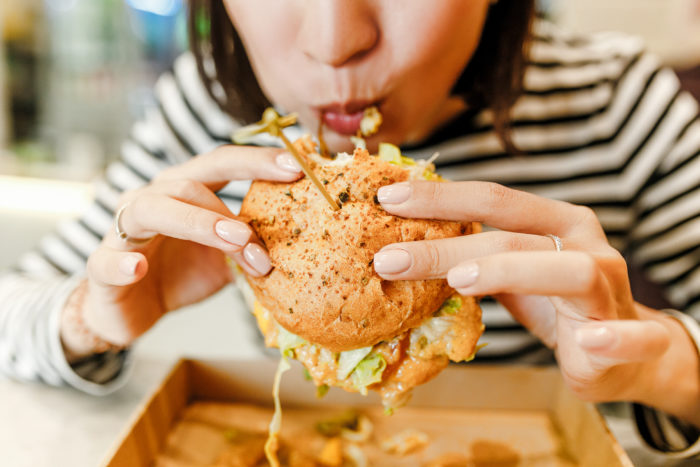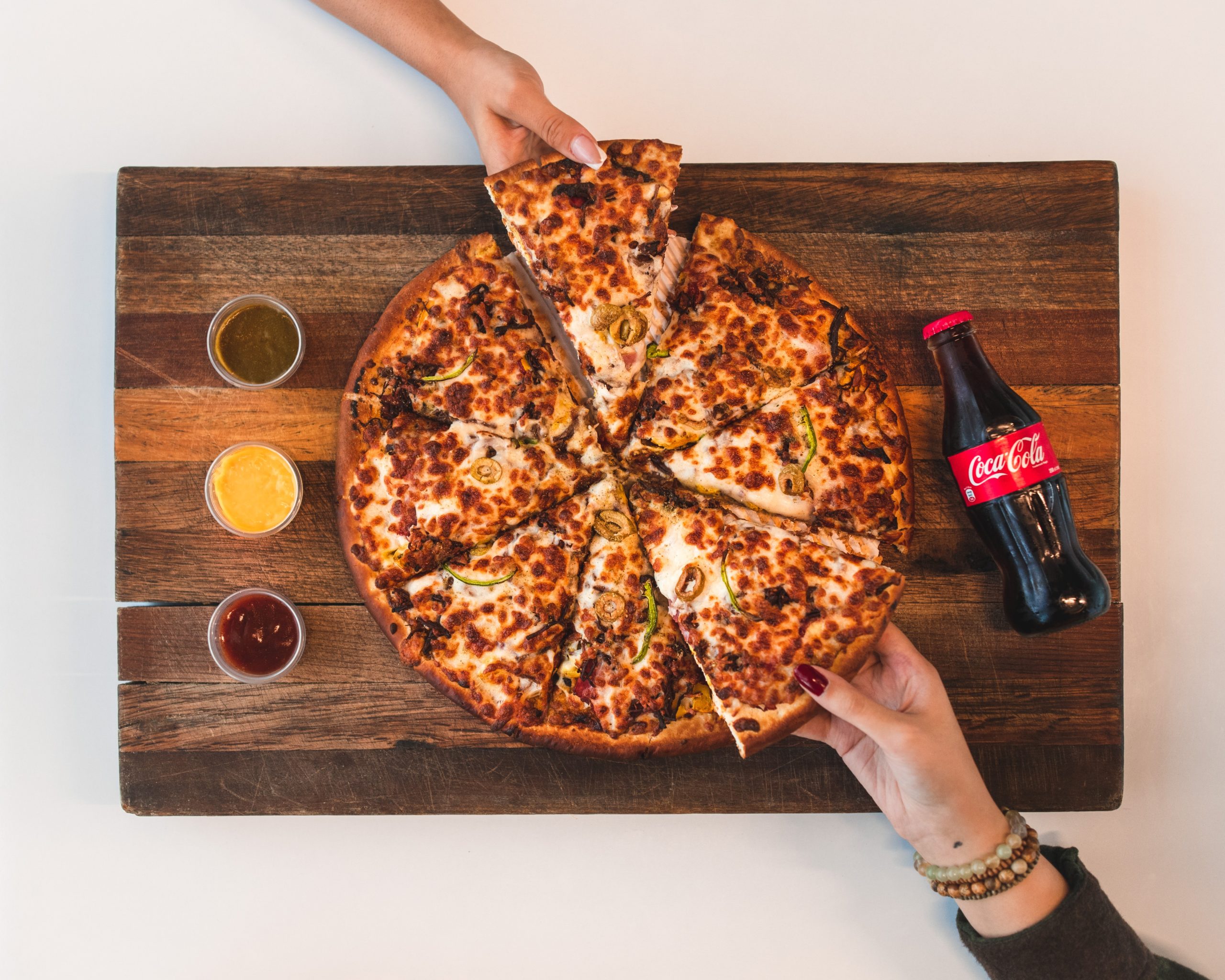Diet culture holds “cheat days” in high esteem, but should you actually have a cheat day? Keep reading to learn what I think about this common dietary practice.
Ah, the “cheat day”. Your day to load up on all the pleasurable foods you’ve been avoiding during the rest of the week.
Proponents of the cheat day say these days give you something to look forward to while on a diet. That they’re a way to reward yourself for cutting and restricting for six out of the seven days of the week. Or that they’re useful for preventing the metabolic slowdown that happens with chronic dieting.
But many women hoping to lose weight end up torn over the decision to have a cheat day or not.
Do they ruin all the other choices you’ve made for the rest of the week? Or do they help keep you on track and motivated towards your fat loss goal?
To “Cheat” or Not To “Cheat”
Deciding whether to have a cheat day is a seemingly important decision to make, especially for women that have a fat loss goal.
But what if I told you that you don’t need a scheduled day to eat what you want?
Even while working towards a weight loss goal, you can have the freedom to eat intuitively. Even if that means a slice of pizza or a bowl of ice cream while out with friends.
These principles are all part of my Fed and Fearless™ approach to health. And when you approach health this way, cheat days become a thing of the past.
So, no… I don’t think you should have a “cheat day”.
And you shouldn’t be restricting yourself in a way that makes you want or need to have a cheat day in the first place.

Why Cheat Days Are So Popular
Cheat days are commonplace in the diet and weight-loss scene. And they’re even becoming more of a trend in the “clean eating” communities as well.
These coveted days allow you to break all diet rules and eat whatever you want, and as much as you want. Whether that’s pizza, ice cream, or simply a piece of fruit (the sugar!!) – you’re now able to indulge in any of the foods you’ve been restricting.
Cheat days were originally seen as simply a morale and mood booster. This day of dietary freedom gives you a chance to unwind and enjoy your favorite foods without guilt.
And there is some truth to that. When on a restrictive diet, cheat days can have physiological benefits.
Physiological Benefits of Cheat Days
Long term caloric restriction can cause a drop in leptin levels (your satiety hormone). Less satiety means more and more hunger as time goes on. Cutting calories can actually make you more susceptible to uncontrollable binges later.
In theory, a cheat day that consists of carb and fat overfeeding could help regulate your leptin levels and keep you from overeating later in the week.
Your thyroid hormones can also be negatively affected by caloric restriction and cutting carbs. Limiting your calorie and carb intake lowers T3 levels. This results in lower thyroid hormone production, and a decrease in your metabolic rate.
Obviously, we want our thyroid to be working at optimal levels to stay healthy. But having a sluggish thyroid is also counterproductive when we’re trying to lose weight. Having a cheat day where you substantially increase calorie and carb intake could help prevent this hormonal decline.
Cheat days can make sense for both a mental and physical reprieve from dieting. But I challenge you to reframe your thinking around losing weight so that cheat days aren’t even necessary.
Is restricting your food so much that you need a day designed to boost your morale, regulate your leptin levels, and keep your thyroid from tanking worth it in the long run?
Probably not.

My Problem With Cheat Days
The problem I have with this “cheat day” mentality isn’t solely with the cheat day itself. Overeating once in a while is perfectly fine and we don’t need to feel any shame around it. My problem is with the diet you choose on the other six days that make cheating necessary.
When you restrict your food intake to a level that necessitates a cheat day for physical and mental health, you lose autonomy over your food choices.
You’re no longer listening to your body and how it needs to be fueled. Rather, you’re stuck to an overly-strict approach that doesn’t take into account your body’s ever-changing needs.
Confining yourself to one scheduled day of dietary freedom is a recipe for almost certain overindulgence.
You’re so much more likely to overeat whatever your favorite cheat day food is when you’ve been severely restricting the rest of the week.
But, if you allow yourself the freedom to enjoy moments as they come, and not make such a big deal about eating foods you enjoy, you’ll feel less desperate and more in control over your cravings and food choices.
“Cheating” is more serious than just eating what you want
Not to mention the concept of “cheating” on your diet gives certain foods the guise of being “bad.” After all, since when was cheating in any way – whether that’s on a test or on your spouse – considered a good thing? Of course anything you eat on a “cheat day” would have some negative or immoral meaning attached to it.
In reality, food does not have morality. Food is food, simple as that. Eating carrots over a pizza does not make you a better or more valuable person.
And the mindset created from the “cheat day” approach is one that applies a false sense of morality to our food choices. We can’t let ourselves attach these moral beliefs to the foods we eat if we want to be mentally and spiritually healthy in the long term.

Breaking Free From the Cheat Day
These rigid diet rules don’t lead to the development of a healthy, Fed and Fearless™ mindset around food.
Focusing on nourishing your body, mind, and spirit, allows you to break free from this cycle of restriction and actually enjoy what you’re eating. Even while still working towards a fat loss goal.
My Fed and Fearless™ approach to diet and weight loss enables you to use your health as a tool to pursue your bigger purpose in life. Compare that to the emotionally-charged approach to health that leaves you feeling run down and trapped by a cycle of dieting and unnecessary control.
If you’ve been stuck in diet culture for a while, this may seem like a difficult concept to grasp. And I completely understand – I was once there too.
I took some time to work on my mindset around food and fitness and submitted this area of my life to God. I’ve learned that breaking free from the cheat day cycle is one of the best things you can do for your health.
Would you like to save this post?
Your email address is 100% safe and will never be sent spam.
Here are a few ways that can get you started with this big mindset shift.
What to Do Instead
The need for a cheat day is the result of an overly restrictive diet.
And the truth is, the restrict and cheat cycle is not the best way to lose extra body fat.
In fact, this diet that mimics a binge and restrict cycle could actually be keeping you from seeing the weight loss you desire.
I’ve coached plenty of women with weight loss goals who were able to shed the excess weight without the need for a cheat day or a restrictive diet.
Intense dietary restriction is not the only way to lose weight. And shifting your mindset away from this will enable you to experience true health.
Instead of slashing calories and counting macros so strictly, what if you allowed yourself the freedom to make intuitive choices that feel right for you?

Give Yourself Freedom in Your Diet
Food freedom is the name of the game when it comes to overcoming the need for cheat days.
Learning how to trust your intuition around food while making reasonable evidence-based habit changes can be a method for successful and sustained weight loss.
If your body actually NEEDS to lose body fat to be optimally healthy, focusing on simple strategies and allowing yourself to trust your body through the process is far more effective than following a strict, joyless diet.
And there are simple habits that you can implement to see progress in your fat loss goals without having to restrict your diet severely or exercise intensely every day of the week.
You don’t have to completely give up your goal of losing body fat if you desire to eat more intuitively.
The first step, though, is to allow yourself freedom from restrictive diets and binge-heavy “cheat days” that you’ve been told is the only way to lose weight.
As you learn how to listen to your body and choose foods with intention and intuition, finding the foods that best nourish your body AND help you reach your weight loss goals will be possible.

Take the Mindset that Every Meal is a Choice
Every bite of food you put in your mouth is a choice. And you have the power and the permission to choose whatever food you want to eat. No strict diet protocol or cheat day schedule can tell you otherwise.
If you’re accustomed to the traditional “restrict during the week and cheat on the weekend” style of dieting, this idea can take some time to get used to.
But, it is possible to lose excess body fat and not follow a regimented eating schedule.
When you give yourself the freedom to make every meal a choice, you’re taking back the power when it comes to your food choices. You’ll stop giving your power away.
You get to make the choices that will lead you closer to achieving your goals. You’ll stop following someone else’s meal plan and forcing it to work for you.
Taking full responsibility for your food choices causes you to become an active participant in your weight loss journey.
Some of your meal choices will be disciplined and purposeful. These will help you take another step towards your physical weight loss goal.
And some meal choices will be more impulsive and fun. These will help you learn that it’s possible to reach your physique goals while caring for your mental wellbeing.
Choosing to eat a meal at home instead of having a pizza night with friends is not a “better” choice. As long as you are accepting of how it will serve you – both physically and mentally – there’s no wrong decision.
“Better” Vs. “Effective”
The question to ask is not which choice is “better” but which is more “effective”. Some days, a home-cooked simple meal will be more effective for promoting health or fat loss. Other days, a meal out with friends or family will be more effective for enjoying your life and connecting with loved ones.
There is no “good” and “bad” – only “effective” and “ineffective”. And how effective a choice is completely depends on your values and goals.
So, don’t hesitate to break free from the chains of restriction and regimented cheating.
Learn to honor your body and your mind by making every meal a choice that is ideally aligned with your personal values and goals. And practice choosing the most effective options as often as possible.

Shifting Your Mindset Around Your Weight Loss Goals
Cheat days and the restrictive diets that make them necessary can become a thing of the past.
Health and weight loss is not a function of restriction and mental willpower.
You can get healthier and even lose weight and keep it off while maintaining your sense of self, supporting your mental health, and pursuing your greater purpose.
And learning to shift your mindset around your weight loss goals is the first step.
Weight loss isn’t something you force your body into. Instead, intuition and intentional experimentation are your guides. Understanding the difference is key to making your efforts sustainable and health-promoting.
This mindset shift is an integral part of my Fed and Fearless™ approach to health. I believe health goals are so much more than a desire for physical change. They are a way to nourish your body, mind, and spirit.
When you approach your health goals from this perspective of self-care, restriction and cheat days no longer have a grip on you. And that is a sign of true health.
What do you think about this approach to weight loss? Do you think cheat days are necessary or is taking a more intuitive approach to losing weight right for you? Share your thoughts in the comments.
This post may contain affiliate links. If you click on a link and make a purchase, I may receive a small commission.

+ show Comments
- Hide Comments
add a comment